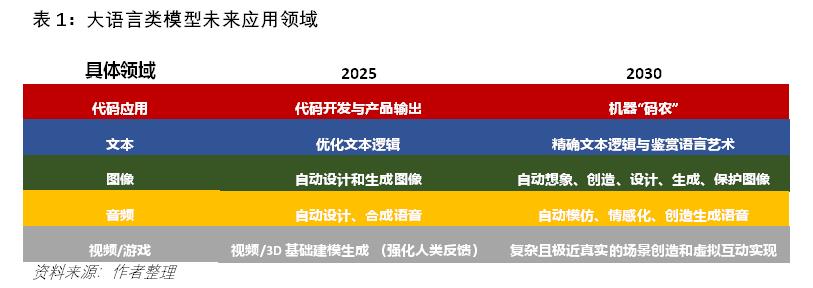Chief economist of ICBC International and director of China Chief Economist Forum. Cheng Shi
Zhang Hongwei, Senior Economist of ICBC International

The future has not really arrived, but it seems to be accelerating. Perhaps the most important practical significance of the craze of ChatGPT is that it has inspired the whole human being to think deeply and be highly alert to AI. We believe that the development of AI technology will have a far-reaching impact on human economy and society from the micro, macro and historical levels: at the micro level, the universality and generalization ability of large language models will stimulate the continuous integration of AI systems with mobile devices, audio, images, videos and other industries in the next 5-10 years, and larger-scale data, better algorithms and faster training will create more valuable business tools for economic activities. At the macro level, the impact of AI technology on real economic activities is still lagging behind ("productivity paradox"), which makes it difficult for the existing economic growth model to fully reflect the complex impact of AI or data element innovation on potential economic growth. With the increasing generalization ability of AI and the uncertainty of understanding the target, the release of commercial value by AI technology innovation will become more unpredictable, which will lead to the discontinuous change of economic growth becoming the norm. On the historical level, it should not be too optimistic that the big language model will lead the future development of AI. After all, the big language model combined with reinforcement learning is not real intelligence, and real artificial intelligence needs to have the ability of judging common sense and self-reasoning. As OpenAI himself said: "ChatGPT is not real intelligence, but it makes people experience the taste that after real intelligence is realized, everyone can achieve their goals through intelligence."
At the micro level, the continuous deduction and iteration of AI technology will bring a new round of application innovation.In the past 20 years, the development of artificial intelligence technology is basically divided into three stages. The first stage is before 2015, people emphasized "deconstruction" in the design and application of AI model, that is, understanding human language through different small models and analyzing tasks in different scenarios. Usually, this kind of model is based on "supervised learning" and is used in special scenes such as industrial manufacturing, transportation and freight transportation, fraud classification and so on. However, this kind of small model is still far from large-scale universality. After 2015, Google Research’s landmark paper "Attention is All You Need" introduced a new neural network model (Transformers) for natural language understanding. This kind of model can generate higher quality language model with less training time through "unsupervised model". Google has further applied these models to different specific fields. Since 2015 -2021, with the increasing magnitude of training data of these models, the accuracy of model generation has been increasing. Combining with AI scientists, the reinforcement learning model is incorporated into the neural network model to enhance the memory of robots, which makes AI’s understanding of words, music, painting, voice, images, videos and other fields gradually exceed the average level of human beings. It is in this context that ChatGPT has achieved a leap from quantitative change to qualitative change. We believe that,Artificial intelligence technologies such as ChatGPT can help people realize more data element innovation, thus changing and enriching consumer behavior. Specifically, the biggest difference between ChatGPT and robots in the past lies in their memory ability. Through continuous intensive training in human environment, ChatGPT can flexibly remember the dialogue information communicated with people and realize continuous dialogue. Compared with Siri or traditional search engines in the past, ChatGPT can continuously realize reinforcement learning from human feedback, which directly changes the way human beings directly obtain information and output content in the economic society. Once the intermediate cost of obtaining information is greatly reduced, the use efficiency of data elements in the digital economy will be significantly improved and labor productivity will be further released. In addition, with the continuous iteration of ChatGPT, the content automatically generated by AI will become more abundant. Whether in text, music, painting, voice, image, video, games and other fields, the possibility of AI participating in the generation will be greatly improved. We expect that a large number of program development will continue to emerge in the next 10 years after 2022 (Table 1), which will accelerate the deep integration of large language systems with current Internet mobile devices, smart cameras and voice recognition systems, thus deeply changing the current consumption patterns and behaviors of the whole society.

At the macro level, the impact of artificial intelligence technology on real economic growth still lags behind, and AI technology will aggravate the irregularity of economic growth in the future.According to Paul Romer, the Nobel laureate in economics, the main reason for the current sluggish global economic growth and long-term stagnation of labor productivity is that we have not yet deeply understood how to fully realize and transform the contribution of digital economic benefits to economic progress. From the root of the problem, economists have many explanations for the long-term economic stagnation, including inefficient business investment, aging population, and general decline in technological innovation. However, Romer pointed out that the general decline in technological innovation may be imprecise. In the information age, the path and direction of technological innovation iteration around data elements are changing compared with traditional ones. There is a lag between the new generation of information technology represented by artificial intelligence, big data and blockchain and the traditional total factor production rate and economic growth. Paul David, an economist at Stanford University, further described this lag as "productivity paradox". He found that it may take more time for the modern computer revolution to significantly improve the productivity level than the power to promote the productivity in the 20th century. Based on the existing literature, there is a significant "diffusion lag" between AI technology and productivity. This is because the development of artificial intelligence depends on the training of data, and the current AI technology takes a long time to collect, process and train data. Take ChatGPT as an example. Compared with the one-way content output of Web1.0 and Web2.0, ChatGPT has the ability of two-way output and interaction.However, ChatGPT still needs a long period from obtaining data to training data. The current data of ChatGPT is updated to 2021, which means that ChatGPT doesn’t know what happened after 2022. Real-time data can’t be dynamically updated, which makes it difficult for AI technologies based on neural network model such as ChatGPT to meet the immediate needs of business value creation. In addition, almost every iteration of AI technology requires corresponding upgrading of external infrastructure, but it is often difficult for external related infrastructure and hardware facilities to effectively support the high supporting demands of AI-related technologies in a short period of time. For example, smart contracts based on blockchain technology can help enterprises to achieve faster, safer and more convenient cooperation agreements. However, the full implementation of blockchain technology actually needs to be based on Web3.0, and the construction of Web3.0 needs to realize the three underlying infrastructure support of untrusted interactive protocol platform, distributed storage and privacy computing, which is why it is difficult for people to deeply feel that AI-related technologies have a direct impact on traditional lifestyles in real activities. However, with the increasing universality of artificial intelligence and the uncertainty of understanding the target, the release of commercial value by AI technological innovation will become more extensive and unpredictable, which means that the discontinuous changes caused by technological innovation on economic growth in the future will gradually become the norm.
Historically, ChatGPT is only a branch in the development of AI and should not be overly optimistic.ChatGPT is mainly constructed in the field of artificial intelligence in the large language induction model. The big language model mainly uses natural language and neural network model to train the language data produced by human beings, and combines reinforcement learning to continuously strengthen AI’s understanding ability of human language. From the feedback mechanism, ChatGPT’s intelligent response is based on the gradient decline of huge data volume. But it is worth emphasizing that pure gradient descent is not the same as intelligence. The so-called intelligence of AI is not only the inductive processing of knowledge, but the most important significance is that AI learns to reason with knowledge and has the ability to recognize common sense. In the past five years, the universality and generalization ability of ChatGPT have indeed been significantly improved, but in the model, we actually don’t know how the generalization ability of the model is formed through model training, and it is difficult for us to clarify the boundary between universality and generalization. Therefore, if ChatGPT is only regarded as a tool to help people achieve their goals, it can indeed generate more commercial value. However, it is an exaggeration to regard AI technology such as ChaGPT as the only way to change human civilization. Because only when AI really realizes knowledge reasoning can it be said that AI has real intelligence. In addition, it should be noted that with the development of AI technology, human beings do have the risk of losing control of AI. Whether from the optimal reward mechanism of operational research, the minimum loss function of statistics or the utility maximization of economics,In today’s standard models, commands to robots will almost lead to AI losing control. This is because in the process of achieving the goal under the standard model, AI is likely to achieve the goal at all costs, even out of control itself. Therefore, in the next 5-10 years, both large language models and other AI models will continue to incorporate new technologies to seek AI’s further understanding of human preferences, which also reflects that human-computer interaction will be an inevitable development trend. Only in this way can we ensure that human beings can reduce the risk of losing control of AI before AI has self-judgment and common sense. Looking back at the development history of AI, people’s exploration of artificial intelligence is still in the "enlightenment era" similar to the early stage of industrial civilization. To be exact, our realization of intelligence is based on the accumulated experience of long-term experiments and observations. If human beings want to realize real artificial intelligence and build a real intelligent system, it is fundamentally to solve how to describe all kinds of irregularities contained in the universe with mathematics or other languages. If we ignore the real significance of mathematical logic and knowledge reasoning to the development of artificial intelligence, human beings are likely to fall into a "self-deception" scam again.
references
Vaswani, A., Shazeer, N., Parmar, N., Uszkoreit, J., Jones, L., Gomez, A.N., Kaiser, ?. and Polosukhin, I., 2017. Attention is all you need. Advances in neural information processing systems, 30.
Jones, C.I., 2019. Paul Romer: Ideas, nonrivalry, and endogenous growth. The Scandinavian Journal of Economics, 121(3), pp.859-883.
Sukumar, A., Jafari-Sadeghi, V., Garcia-Perez, A. and Dutta, D.K., 2020. The potential link between corporate innovations and corporate competitiveness: evidence from IT firms in the UK. Journal of Knowledge Management, 24(5), pp.965-983.
Thorp, H.H., 2023. ChatGPT is fun, but not an author. Science, 379(6630), pp.313-313.
Zhou, C., Li, Q., Li, C., Yu, J., Liu, Y., Wang, G., Zhang, K., Ji, C., Yan, Q., He, L. and Peng, H., 2023. A Comprehensive Survey on Pretrained Foundation Models: A History from BERT to ChatGPT. arXiv preprint arXiv:2302.09419.


